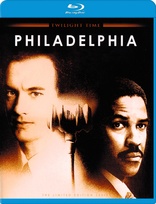Philadelphia Blu-ray Movie
HomePhiladelphia Blu-ray Movie 
Limited Edition to 3000 - SOLD OUTTwilight Time | 1993 | 125 min | Rated PG-13 | May 14, 2013
Movie rating
7.7 | / 10 |
Blu-ray rating
| Users | 4.2 | |
| Reviewer | 4.0 | |
| Overall | 4.0 |
Overview
Philadelphia (1993)
When a man with AIDS is fired by a conservative law firm because of his condition, he hires a homophobic small time lawyer as the only willing advocate for a wrongful dismissal suit.
Starring: Tom Hanks, Denzel Washington, Jason Robards, Mary Steenburgen, Antonio BanderasDirector: Jonathan Demme
| Drama | 100% |
Specifications
Video
Video codec: MPEG-4 AVC
Video resolution: 1080p
Aspect ratio: 1.85:1
Original aspect ratio: 1.85:1
Audio
English: DTS-HD Master Audio 5.1
Music: DTS-HD Master Audio 2.0
Subtitles
English SDH
Discs
50GB Blu-ray Disc
Single disc (1 BD)
Playback
Region free
Review
Rating summary
| Movie | 4.0 | |
| Video | 4.0 | |
| Audio | 4.0 | |
| Extras | 1.5 | |
| Overall | 4.0 |
Philadelphia Blu-ray Movie Review
You call this brotherly love?
Reviewed by Jeffrey Kauffman May 15, 2013My eldest sister was a public health official at the dawn of the AIDS era and one of her job duties was to provide AIDS awareness and education to the residents of several rural communities in Eastern Oregon. It’s perhaps hard to imagine such a thing now, but people were seriously concerned about things like AIDS being transmitted through the air or casual touches, and in hardscrabble farming communities like the ones my sister was working in there was a none too subtle whiff of homophobia running rampant just beneath that misplaced if understandable anxiety. It may seem a bit easier to “accept” supposedly unsophisticated folks’ reactions to what seemed like a modern plague, but how does one come to terms with ostensibly more upscale and highly educated professionals’ very similar reactions? That’s one of the underlying issues in Philadelphia, the film that kind of broke the strange silence surrounding AIDS in mass media other than often hysterical news reports. Philadelphia was a ground breaking film in its day, but even when it was originally released some at least pointed out how formulaic the film was, even if it was dealing with a then unusual subject matter. That element of the film hasn’t aged particularly well, and in fact the blatantly manipulative aspects of Ron Nyswaner’s screenplay are even easier to spot now, given the luxury of hindsight. But Philadelphia still remains a largely riveting experience, due in no small measure to the outstanding work of co-stars Tom Hanks (who won a Best Actor Academy Award for his efforts) and Denzel Washington.
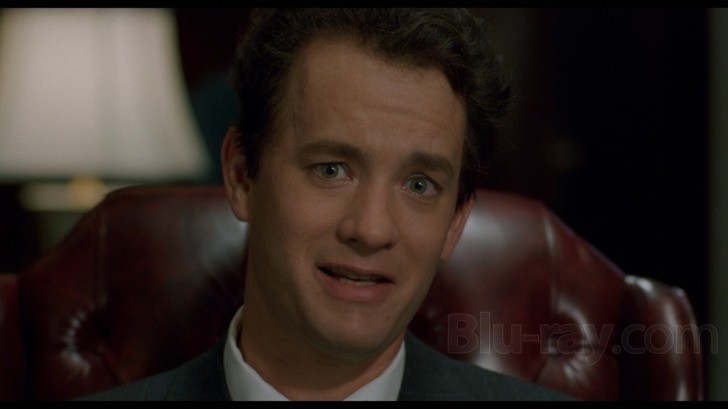
Tom Hanks portrays Andrew Beckett, a Philadelphia attorney whom we meet in an early scene as he debates with another attorney, Joe Miller (Denzel Washington), over whether limestone dust at a construction site is posing a health hazard to neighborhood children. Beckett has gone the corporate route, working for a huge partnership and obviously hoping that he will one day join that august assemblage as partner himself, and he of course is siding with the construction firm. Miller on the other hand is a sole practitioner, a man who works for himself and makes do with the lower level cases that come his way, and is representing "the common man", in this case the kids. Beckett prevails in this particular instance, but the basic career arcs of both men are aptly summed up in brief (to borrow a legal term) in this opening scene. The story then moves on to its main focal point, as we come to realize that Beckett is a somewhat closeted gay man (at least with regard to his work environment) who is suffering from AIDS. This was in the early days of the spread of the disease, when treatments hadn’t yet been developed and the disease wreaked havoc not just on the immune system, but the appearances of its victims. Beckett is beginning to break out in pretty nasty looking lesions, something that comes to the attention of some of his co-workers.
When Beckett attempts to hide his infirmity by working from home, things backfire when a pleading he was working on and had delivered to the office supposedly gets misplaced, almost costing the firm a major client. Beckett is accused of being slipshod and is fired. Beckett has a sneaking suspicion that his sexual orientation and disease were the real reasons behind his termination, and he seeks to sue the lawfirm for damages. He soon realizes that his former employer’s reputation means that no major attorney will represent him, and he ends up turning to his one time adversary Miller, who declines to help him as Miller has a none too disguised if at least basically "civil" homophobia. Beckett then decides to represent himself, but when by chance Miller sees some rampant discrimination aimed toward Beckett at a public library, his conscience gets the best of him and he ultimately agrees to take on the case.
The film then skips ahead several months to the actual trial, which plays something like (and please forgive me this horrible, horrible pun) Gayvid versus Goliath. Beckett’s former employers have gotten to some of the prospective witnesses for Beckett, and they change their testimony. Furthermore, the curt defense lawyer (Mary Steenburgen) representing the law firm has dug up all sorts of dirt on Beckett and makes hay with revelations about his somewhat sordid sex life. Playing out against all of this is Beckett’s precipitously declining health and Miller’s growing understanding that gay people are human, too.
For a film with as laudatory, even noble, a thesis as Philadelphia, not to mention one with such a stellar starring performance, it may strike some as outright heresy to suggest there are any flaws at all in this enterprise, and yet that’s what I’m about to do. There certainly can’t be any fault found with either Hanks’ or Washington’s work here, but the same can’t be said for Nyswaner’s screenplay or at least some of director Jonathan Demme’s techniques. Nyswaner paints several of the law firm partners in such broad strokes that one almost expects them to start twirling wax mustaches. Demme exacerbates this problem with leering dollies in to bizarre angles on several of these characters, notably lead partner Charles Wheeler (Jason Robards). The film also doesn’t just tug at the heartstrings in its closing moments, it virtually yanks them, to maudlin effect. There’s no denying the emotional impact of the film’s final scenes, but there’s also no denying that they seem carefully crafted to turn the film into a three hankie (or should that be Hanks-ie) weeper instead of an attempt to highlight what was then (and perhaps even now) a lingering injustice perpetrated against those afflicted with a horrible disease.
Philadelphia Blu-ray Movie, Video Quality 
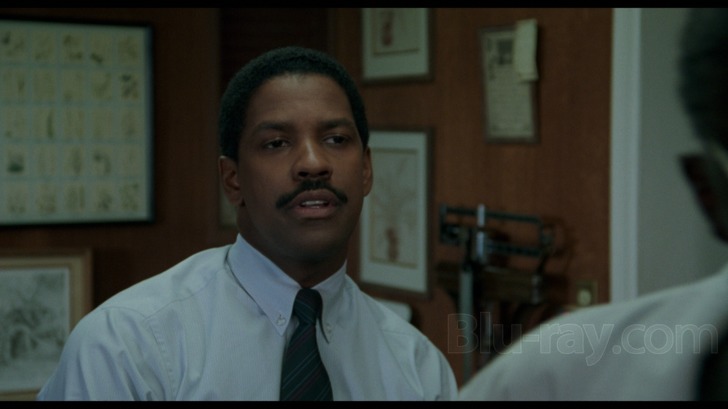
Philadelphia is presented on Blu-ray courtesy of Twilight Time with an AVC encoded 1080p transfer in 1.85:1. A lot of this film takes place in dark interior spaces, and this high definition presentation can only do so much with elements that don't intrinsically offer much shadow detail to begin with. Similarly, much of the film is bathed in brown tones, which means there aren't a lot of bright primary colors which allow the transfer to really pop in a traditional "wow" manner. With that understanding, this presentation looks quite good, with admirable fine object detail, and a nicely saturated, if usually quite muted, palette. When the film ventures out of doors or we get brightly lit daytime scenes, things improve markedly. There's a very fine layer of grain evident throughout this presentation. There are a couple of strange anomalies that I frankly had never noticed before in previous home video incarnations, which may simply be due to the increased resolution of the Blu-ray. The most noticeable of these is a kind of weird reflection that takes place in the library scene when the camera pans to the library worker asking Beckett to move. It almost looks like the camera was shooting through a Plexiglas window for some reason. It's not traditional lens flare (at least like any lens flare I've ever seen).
Philadelphia Blu-ray Movie, Audio Quality 
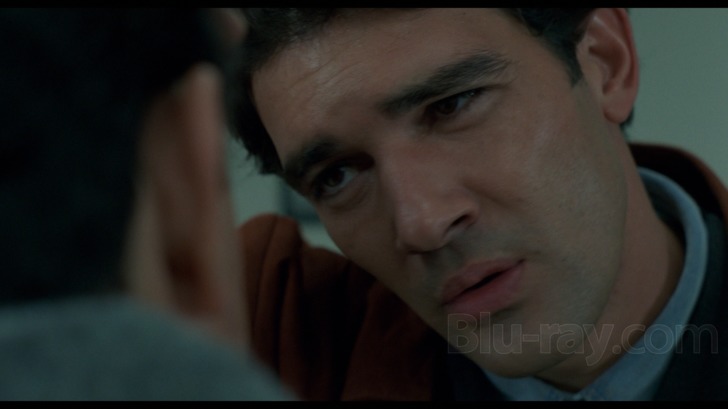
Philadelphia's lossless DTS-HD Master Audio 5.1 springs mostly to life in its two beautiful bookending songs as well as in some of the busy Philadelphia cityscape sequences. Otherwise, dialogue tends to be anchored in the front channels, though occasionally there are some smart uses of the surrounds to indicate Beckett's declining health (and perhaps mental) state, including neatly muffled noises that surround him in the trial's climactic moment. Fidelity is very good, but dynamic range is fairly limited.
Philadelphia Blu-ray Movie, Special Features and Extras 
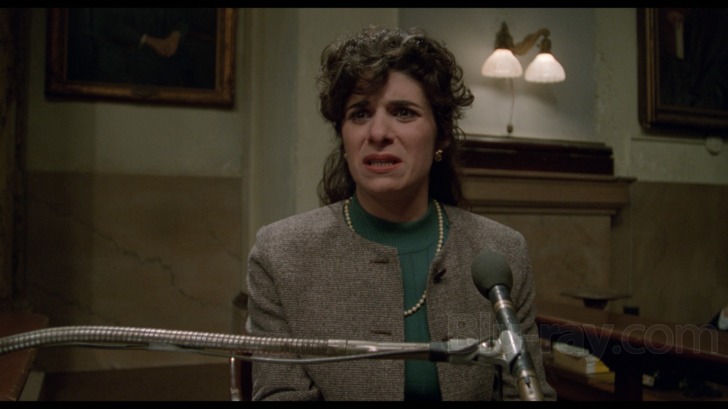
- Deleted Scenes (480p; 11:18)
- Courthouse Protest Footage and Interviews (480i; 4:26)
- Making of Philadelphia (480i; 5:59) is a vintage featurette that has some interesting behind the scenes footage.
- Original Theatrical Trailer (480p; 3:03)
- Isolated Score Track is presented via DTS-HD Master Audio 2.0. As good as Howard Shore's score is, this track unfortunately does not also include the songs or source cues (probably due to licensing issues), including Bruce Springsteen's Oscar winning "Streets of Philadelphia" as well as Neil Young's elegiac closing song "Philadelphia".
- Audio Commentary features director Jonathan Demme and screenwriter Ron Nyswaner. This is a really interesting, detailed commentary track that gets into the somewhat long gestational period of the film and its ultimate production. Nyswaner especially has some touching anecdotes he shares along the way about his personal experiences that led to him wanting to write this screenplay.
Philadelphia Blu-ray Movie, Overall Score and Recommendation 

Philadelphia may strike some as overly mawkish and simple minded, but one has to place the film in its proper historical context to really appreciate what a valiant effort it was. While some aspects of the film have not aged particularly well, the two lead performances still have awesome power and visceral intensity. The supporting cast is also wonderful, even if Robards is forced to chew the scenery with abandon (at least he's balanced by a touchingly understated turn by Joanne Woodward as Beckett's anguished mother). This Blu-ray offers very good video and audio and has some decent supplements. Recommended.
Similar titles
Similar titles you might also like

The Judge
2014

Truth
2015

Just Mercy 4K
2019

The People vs. Larry Flynt
1996

Richard Jewell
2019

On the Basis of Sex
2018

Bombshell
2019

Marshall
2017

Roman J. Israel, Esq.
2017

The Whole Truth
2016

True Story
2015

Woman in Gold
2015

Molly's Game
2017

Evelyn
2002

The Mauritanian
2021

Conviction
2010

Dallas Buyers Club
2013

The Visitor
2007

Welcome to Marwen
2018

The Personal History of David Copperfield
2019
